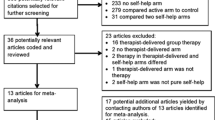Abstract
Given that the development of treatment fidelity assessment protocol is an integral but too frequently ignored aspect of clinical trials for psychological treatments, the Intensive Mental Health Program (IMHP) sought to build fidelity activities into training, program evaluation, and clinical recordkeeping from the outset of a 3 year study period. We describe (a) operational definitions and measurement of the IMHP treatment model, (b) planned fidelity-promoting activities, (c) evaluation methods, and (d) fair to appreciable accomplishment of IMHP fidelity targets. Discussion of the circumstances and processes possibly hindering better fidelity for several IMHP treatment features accompanies presentation of fidelity data. We summarize pitfalls and compensatory strategies identified during IMHP program evaluation and offer practical suggestions to enhance accountability and evaluative activity in future clinical research.
Similar content being viewed by others
References
Bellg, A. J., Borrelli, B., Resnick, B., Hecht, J., Minicucci, D. S., Ory, M., et al. (2004). Enhancing treatment fidelity in health behavior change studies: Best practices and recommendations from the NIH behavior change consortium. Health Psychology, 23, 443–451.
Henggeler, S. W. (2001). Multisystemic therapy. In S. I. Pfeiffer & L. A. Reddy (Eds.), Innovative mental health interventions for children: Programs that work (pp. 75–85). New York: Haworth.
Lichstein, K. L., Riedel, B. W., & Grieve, R. (1994). Fair tests of clinical trials: A treatment implementation model. Advances in Behaviour Research and Therapy, 16, 1–29
Moher, D., Schulz, K. F., & Altman, D. G. (2001). The CONSORT statement: Revised recommendations for improving the quality of reports of parallel-group randomised trials. The Lancet, 357, 1191–1194.
Moncher, F. J., & Prinz, R. J. (1991). Treatment fidelity in outcome studies. Clinical Psychology Review, 11, 247–266.
Puddy, R. W., Boles, R. E., Dreyer, M. L., Maikranz, J., Roberts, M. C., & Vernberg, E. M. (this issue). Demonstrating support for the formative and summative assessment paradigm in a school-based intensive mental health program. Journal of Child and Family Studies. doi: 10.1007/s10826-007-9164-z.
Puddy, R. W., Roberts, M. C., & Vernberg, E. M. (2005). Service coordination as a predictor of functioning in a school-based intensive mental health program. In C. Newman, C. J. Liberton, K. Kutash, & R. M. Friedman (Eds.), The 17th annual research conference proceedings. A system of care for children’s mental health: Expanding the research base (pp. 102–105). Tampa, FL: Louis de la Parte Institute.
Roberts, M. C., Jacobs, A. K., Puddy, R. W., Nyre, J. E., & Vernberg, E. M. (2003). Treating children with serious emotional disturbances in schools and community: The intensive mental health program. Professional Psychology: Research and Practice, 34, 519–526.
Roy, K. M., Roberts, M. C., Vernberg, E. M., & Randall, C. J. (this issue). Measuring treatment outcome for children with serious emotional disturbances: Discriminant validity and clinical significance of the child and adolescent functioning assessment scale. Journal of Child and Family Studies. doi: 10.1007/s10826-007-9162-1.
Vernberg, E. M., Jacobs, A. K., Nyre, J. E., Puddy, R. W., & Roberts, M. C. (2004). Innovative treatment for children with serious emotional disturbance: Preliminary outcomes for a school-based intensive mental health program. Journal of Clinical Child and Adolescent Psychology, 33, 359–365.
Vernberg, E. M., Roberts, M. C. & Nyre, J. E. (this issue a). The Intensive Mental Health Program: Development and structure of the model of intervention for children with serious emotional disturbances. Journal of Child and Family Studies.
Vernberg, E. M., Roberts, M. C., & Nyre, J. E. (2002). School-based intensive mental health treatment. In D. T. Marsh & M. Fristad (Eds.), Handbook of serious emotional disturbance in children and adolescents (pp. 412–427). New York: Wiley.
Vernberg, E. M., Roberts, M. C., Nyre, J. E., Jacobs, A. K., & Randall, C. J. (this issue b). Outcomes and findings of program evaluation for the Intensive mental health program. Journal of Child and Family Studies.
Vernberg, E. M., Roberts, M. C., Randall, C. J., Biggs, B. K., Nyre, J. E., & Jacobs, A. K. (2006). Intensive mental health services for children with serious emotional disturbances through a school-based, community-oriented program. Clinical Child Psychology and Psychiatry, 11, 417–430.
Author information
Authors and Affiliations
Corresponding author
Rights and permissions
About this article
Cite this article
Randall, C.J., Biggs, B.K. Enhancing Therapeutic Gains: Examination of Fidelity to the Model for the Intensive Mental Health Program. J Child Fam Stud 17, 191–205 (2008). https://doi.org/10.1007/s10826-007-9159-9
Published:
Issue Date:
DOI: https://doi.org/10.1007/s10826-007-9159-9




